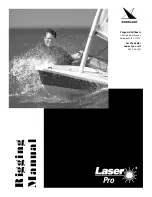
9
hobie.com
Handling and Maintenance
Righting your Hobie Cat
If you tip the boat over, in order to avoid the mast from sinking under the
hull, one of the crew must rapidly climb on the hull that remains on the
water. In the meantime, the other crew uncleat all the lines and sheets.
It is not necessary, but it is easier, to right the boat when the bow and
the mast are pointed into the wind. There will be less resistance and
better control in this position.
Skipper and crew stand up on the hull. Using the righting line, skipper
and crew pull the righting line that is against the upper hull and hold the
line while slowly leaning back away from the trampoline. As the mast
and sail lift out of the water, drop down to your knees then into the wa-
ter. Hold on to the crossbar near the hull that you were standing on.
Be well aware of the hull and crossbar coming down over your head.
Holding the crossbar or righting line will also insure that you remain
with the boat when it is righted. Climb aboard and continue sailing.
Maintenance of your Hobie
This manual is not an exhaustive guide for the maintenance or repair of
your Hobie.
Always use the service of an experienced professional for the
maintenance, the mounting of accessories or the modifications to your
Hobie.
Modification that may affect the safety use of the boat must be checked
before processing and made by an experienced professional. The
builder cannot be held for responsible for modification that he has not
duly approved.
In some countries, prior authorizations are necessary or specific
regulations are in force. Check them. Always maintain your boat and
take into account the deterioration that may occur with the time or
following inappropriate or intensive use. Any boat (even the strongest
one) may be severely damaged if it is not used the right way. This is not
compatible with safe sailing.
• Hobie Cat does not recommend leaving your Hobie in the water on a
mooring. Accelerated wear to the boat and rigging will be
• experienced. Damage to the hull material is possible. Limitation
of the mast rotation and tensioning of the rigging are required to
lessen this wear. Inspect rigging often and tape rigging rings and
shackles to prevent loosening.
• After sailing, it’s recommended to wash the hulls to remove the salt.
Also remove the sails and wash them. Only store them when they
are perfectly dry.
• There is one plug in the rear of each hull. These plugs are used to
drain the hulls. The plugs should be in place before sailing. Remove
the plugs after sailing to drain any water that may have leaked into
the hulls. It is best to travel with and store the boat with the plugs
removed to allow for pressure changes due to heating, cooling, and
altitude changes. This will prevent warping of the hull surface.










































